May 22, 2025 | 12:16 GMT +7
May 22, 2025 | 12:16 GMT +7
Hotline: 0913.378.918
May 22, 2025 | 12:16 GMT +7
Hotline: 0913.378.918
Mr. Bui Xuan Thang (35 years old, Director of Cau Dat Bean Coffee Company, Xuan Truong commune, Da Lat city, Lam Dong) shared that the Cau Dat region is known as the place of specialty coffee. This is a land famous for Moka coffee, Arabica coffee, etc. However, coffee producers here have fallen into difficulties and deadlocks for many years due to negative market fluctuations.
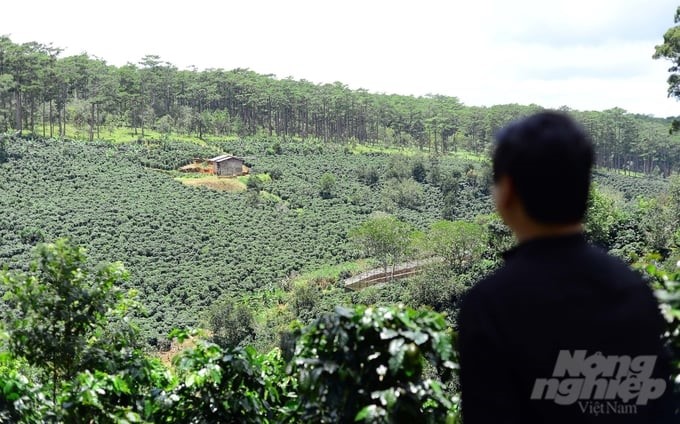
A corner of the 29-hectare organic coffee area of Cau Dat Bean Coffee. Photo: Minh Hau.
Coffee did not help people's lives get better, so many households decided to switch to other crops. Some households even sold their gardens and houses and moved to other places to find a livelihood.
Mr. Bui Xuan Thang used to be attached to business in Ho Chi Minh City, and in 2014, he decided to go to the Cau Dat region (Da Lat city) to start a business. Passionate about agriculture, Mr. Thang used all his accumulated capital to buy a small garden for coffee production. "Before starting to grow coffee, I researched, learned, and consulted documents ranging from basic to in-depth scientific. However, when directly producing, I faced many complex problems that could not be resolved. There were times when I had to meet experienced farmers in the locality to get information and ask for help," he said.
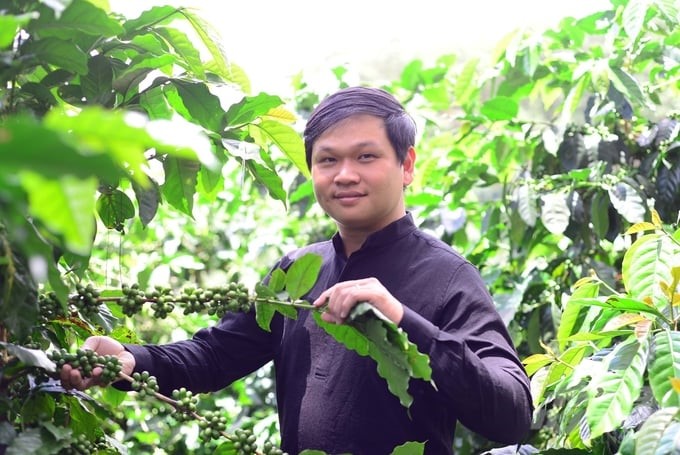
The replanted coffee garden with organic processes at Mr. Bui Xuan Thang's farm has been in business with a yield of 3–3.5 tons of beans/ha. Photo: Minh Hau.
His company has linked with households to implement the organic coffee production process on a total area of 29 hectares. Coffee here includes Arabica and Moka. Among them are ancient Moka roots that are up to decades old. This area has had to undergo reclamation and construction for many years.
During the 2014–2015 period, the entire coffee area here entered the old stage, with low yields and poor product quality. Especially in the garden, the soil is dry and lacks microorganisms.
In order to recover the green color of coffee and “revive” the garden, Mr. Bui Xuan Thang, along with his colleagues and affiliated farmer households, jointly conducted a "revolution" on a large scale. Old, disease-infected, poor-quality coffee areas are all cut down. The process of eliminating pathogens in the soil and detoxifying the soil was carried out over a period of one year by Mr.Thang.
Mr. Thang said, "We leave behind the ancient Arabica and Moka roots and areas where the trees are still healthy and productive, and put the rest into the reclamation process. For each hectare, we have to spend about VND 100 million to plow, hoe, and treat the soil. This is the time when a lot of effort and money was spent, and also the period when many people doubted the project’s success."
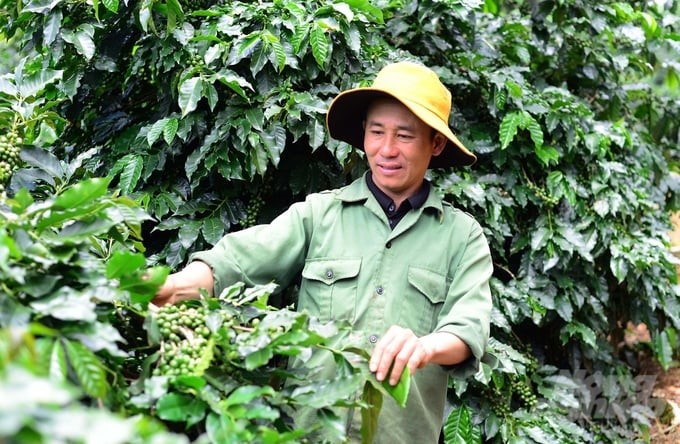
Coffee from households in the organic coffee production linkage is being purchased by Cau Dat Bean at a price VND 3,000/kg higher than the market price. Photo: Minh Hau.
After one year of land reclamation, Mr. Thang replanted new batches of Arabica and Moka coffee. He also began to implement the organic production process. To meet standards, Mr. Thang installed an irrigation system throughout the garden. Along with that, all chemical fertilizers and pesticides were removed from the production list. Instead, he used organic fertilizers and microorganisms to care for plants and use biological products to prevent pests and diseases from plants.
The Director of Cau Dat Bean Coffee Company said, "Thanks to the land and water sources guaranteed, combined with strict production processes, by 2019, all trees in the garden had grown strongly. At the same time, the agriculture sector of Lam Dong province had supported the development of organic agriculture, so everything became favorable. Currently, all trees in the garden have been in business with a yield of 3–3.5 tons of green beans/ha."
Currently, to ensure products meet standards, Cau Dat Bean Coffee Company organizes coffee harvesting by selective method, picking 100% ripe fruits. After harvesting, coffee will be transferred to the drying process, pre-processed, and then transferred to the processing factory. According to Mr. Bui Xuan Thang, the unit now purchases coffee from affiliated households at a price about VND 3,000/kg higher than the price of traditional coffee on the market.
The 8X Director shared that bringing the coffee garden into the organic process is a laborious and costly process that constantly faces difficulties and challenges. When plants can survive in an organic environment and give good yields and product quality, producers face market problems.
“Initially, the company's coffee products did not have a stable consumption market, so they still had to be sold at normal prices. The cost of producing 1kg of organic coffee is much higher than the traditional method, so impossibly finding our own market has made it difficult for us to increase profits," said Mr. Bui Xuan Thang.
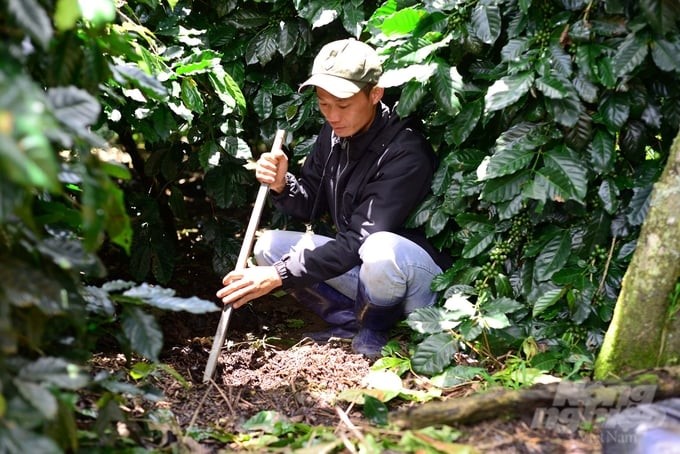
With organic processes, the soil in the coffee garden maintains moisture and is non-cohesive with many microorganisms. Photo: Minh Hau.
Up until now, after many years of being consistent with the organic path and constantly searching for markets, Cau Dat Bean's organic coffee products have been well received by international markets. Accordingly, each year, Cau Dat Bean produces about 180 tons of beans, which are consumed by partners in demanding markets such as the EU, US, Japan, Korea, etc. Mr. Bui Xuan Thang said that the partner signed a consumption contract to purchase the company's organic coffee products at a price of VND 240 million/ton, about 30% higher than traditional coffee products.
Talking about future development plans, Mr. Thang said that organic agriculture is a world trend. Furthermore, in the face of fluctuations in market prices, the production of quality products and organic production is essential to increasing value and meeting economic development.
Bui Xuan Thang shared: "I started organic production for many reasons. Partly because we wish to create products that are good for health and protect the environment, and partly because we want to enhance the value of specialties in the Cau Dat region. In the future, I hope to develop further and open up the market to have opportunities to link with and help local coffee producers."
According to Mr. Bui Xuan Thang, every year, the company spends a part of its profits in business and coordinates with foreign partners to organize gratitude programs, organize gift giving, and award scholarships to children of coffee-growing families.
The company is also always striving to expand the market and is ready to link with households with the orientation of developing organic agriculture. He said, "This is also a way to expand raw material areas, bring benefits to people, improve the environment, and offer many quality products that ensure the health of domestic and foreign consumers."
Translated by Huyen Vu Thu
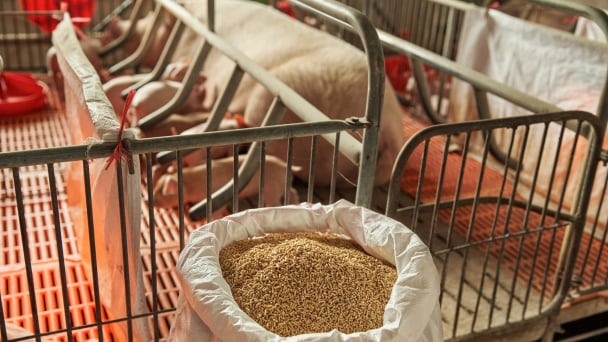
(VAN) CJ Feed&Care officially launched the FCR improvement campaign called “2025 Find Challenge Reach” in April 2025. In Vietnam, this campaign is implemented by CJ Vina Agri.
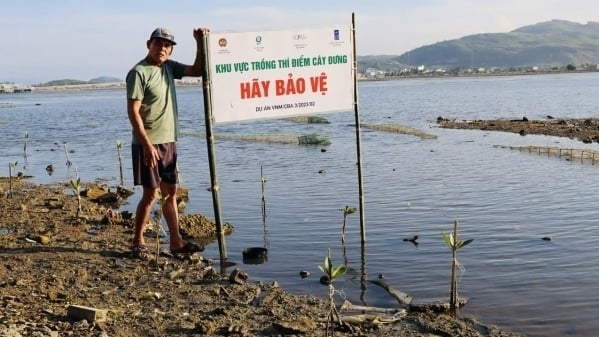
(VAN) The swamp in Pho Thanh is gradually being covered with red mangrove, creating a favorable environment for producing clean, high-quality salt.

(VAN) The trade turnover of agro-forestry-fishery products is growing significantly, along with investment cooperation commitments that are opening up new development directions between Vietnam and Russia.

(VAN) Khanh Hoa is investing over 545 billion VND to develop 240 hectares of high-tech marine aquaculture in order to guarantee a consistent supply of seafood exports and achieve the USD 1 billion target.

(VAN) Minister of Agriculture and Environment Do Duc Duy held a meeting with Soopakij Chearavanont, Chairman of C.P. Group, on May 15.
/2025/05/16/3800-0-nongnghiep-143756.jpg)
(VAN) Suntory PepsiCo Vietnam coordinated with the Ministry of Education and Training to implement an education program on water conservation, reaching nearly 1 million primary school students nationwide.

(VAN) Vietnam’s TH Group officially put its high-tech fresh milk processing plant into operation in the Russian Federation, marking a historic moment as the first TH true MILK cartons were produced in Russia.